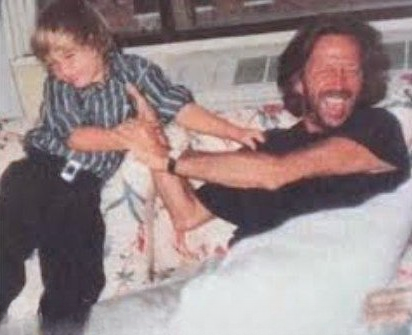By that point, Eric Clapton had endured more than most could ever imagine. He had battled heroin addiction, teetered on the edge of self-destruction with alcohol, and survived the deaths of peers like Jimi Hendrix, Duane Allman, and Stevie Ray Vaughan—each claimed by their own struggles and genius. Yet Clapton endured. In 1987, he achieved sobriety, a turning point made even more meaningful by the arrival of his son, Conor, the year before.
Conor, born in 1986 to Italian actress Lori Del Santo, became the reason Clapton chose life over despair. Though Clapton and Del Santo were no longer a couple, their shared devotion to Conor created a strong, unbreakable connection. For Clapton, who had spent years trapped by addiction and regret, Conor’s arrival was a lifeline—a purpose, a chance at redemption.
On that tragic March morning, Clapton planned a simple day with his four-year-old son: a trip to the Bronx Zoo. Conor was at his mother’s apartment on the 53rd floor of a Manhattan high-rise, waiting eagerly for his father. Unbeknownst to anyone, a window had been opened by maintenance workers cleaning the building’s exterior. Full of energy and excitement, Conor ran through the apartment, unaware the glass was gone—and in a single instant, he fell.
Fifty-three stories.
When Clapton arrived, he was met with a scene from a nightmare: emergency sirens, paramedics, police, and neighbors frozen in disbelief. His son was gone.
Grief is a force unlike any other. Losing a child is not only losing a loved one—it is losing all the moments you were meant to share: birthdays, laughter, hugs, “I love yous,” erased in an instant. For Clapton, music had always been a refuge, a way to transform pain into something beautiful. But after Conor’s death, even that solace seemed out of reach. His guitars remained untouched, his home silent, mirroring the emptiness in his heart.
Yet grief finds its own voice. Slowly, Clapton returned to his guitar—not to forget, but because music alone could carry the weight of his sorrow. From this darkness, “Tears in Heaven” emerged, co-written with lyricist Will Jennings. The song became a universal anthem for mourning, capturing the heartbreak of losing someone irreplaceable.
“Would you know my name if I saw you in heaven?
Would it be the same if I saw you in heaven?”
Every line transformed raw grief into melody. It wasn’t merely a song about death; it was a father’s desperate question: would my child remember me if we met again?
Released in 1992 on Clapton’s Unplugged album, the song resonated deeply. It won three Grammy Awards, yet its true impact lay in its ability to articulate the unspeakable, giving comfort to anyone who had lost someone irreplaceable. For years, Clapton performed it at nearly every show, reliving the pain each time. Eventually, he stopped. “I didn’t feel the loss anymore,” he said. “That loss was part of performing the song. It was time to let it rest.”
Conor’s death reshaped Clapton’s life. Sobriety, once a personal struggle, became a sacred commitment. Staying clean was no longer about fame or health—it was about honoring his son, being the man Conor would have needed him to be.
In 1998, Clapton founded the Crossroads Centre in Antigua, a treatment facility for those battling addiction. Through benefit concerts, he supported the center for years, helping thousands reclaim their lives. This became his way of turning overwhelming grief into purpose—a promise that Conor’s short life would leave a lasting impact.
Now, at 79, Clapton has been sober for nearly four decades. He rarely speaks of Conor, yet when he does, there is a quiet acknowledgment that some grief never fully disappears. Parents who have lost children know this: the pain never fades—it transforms, becoming a part of who you are.
For Clapton, that grief continues to inspire. It lives in his music, the foundation he built, and the life he leads with humility and intention. Through his suffering, he has given others permission to grieve, to feel, and to heal. “Tears in Heaven” is not just about Conor—it is about every loss too heavy for words.
Conor’s brief life lasted only four years, but his legacy extends far beyond. He transformed his father, and through him, touched the world of music. The tragedy that ended his life also gave birth to one of the most enduring songs ever written—a reminder that love, even when cut short, endures forever.
